News
Little hope for the Uma Oya homeless
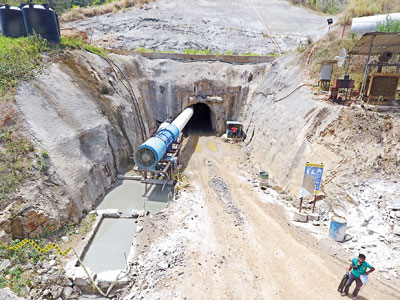 Thousands of fearful people in Bandarawela who abandoned their precious homes after watching their dreams fall to pieces in the wake of the much-maligned Uma Oya hydropower and irrigation project bankrolled by Iran, may be re-settled on tea estates.
Thousands of fearful people in Bandarawela who abandoned their precious homes after watching their dreams fall to pieces in the wake of the much-maligned Uma Oya hydropower and irrigation project bankrolled by Iran, may be re-settled on tea estates.
Yet more families became displaced people in their own homeland this week as a result of the continuing destruction caused by a US$529 million (Rs 78.46 billion) project that promises a pot of gold.
Academics point to flawed environmental impact assessments among other things for the nightmare playing out in the central highlands where homes and other social infrastructure such as schools and places of worship, are continuing to crumble, wells have turned into dry holes, while agricultural lands – the lifeblood of the communities – have become sites of despair.
So far, the controversial project, which aims to divert river water from the central highlands to the drier southern regions, has laid to waste more than 3,900 homes and 500 wells, while making 1,500 families homeless.
The project launched in 2011, will divert water from Welimada to Wellawaya through a tunnel and is also expected to generate 120 megawatts of hydropower.
Two dams are being built across two main tributaries of the Uma Oya at Welimada and Dayaraba and an underground power station is being built at Randeniya.
About eight kilometres of the 15-kilometre tunnel has been completed by a tunnel boring machine. Iran’s Farab Energy and Water Project Company is the main contractor. The Ministry of Power and Energy is implementing the project.
In Bandarawela, where the damage to homes is severe, local officials say they are discussing ways to assist the displaced. At a meeting at the Divisional Secretary’s office in Bandarawela they decided to offer a monthly rent of Rs 15,000 for alternative accommodation and also provide 500 litres of water every week for each family. 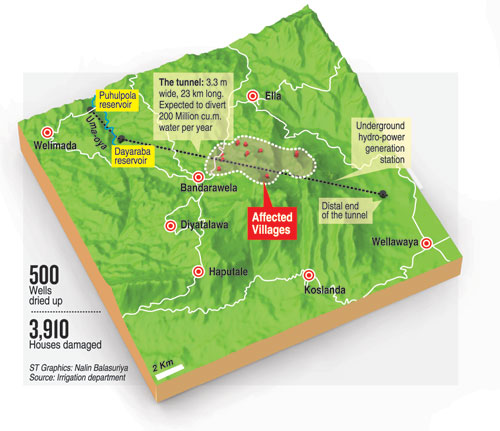
Dr. Jagath Gunathilake, the head of the Department of Geology, Faculty of Science of the Peradeniya University, who was a member of panel appointed by the Mahaweli Ministry to submit a report on the project told the Sunday Times, the Environmental Impact Assessment was weak. Local and international experts should have been consulted on the impact on the environment, before the Uma Oya project was approved, he added.
Climate conditions as well as soil should have been taken into consideration, he said.
Project Director attached to the Mahaweli Ministry, Dr Sunil Silva told the Sunday Times, that for the first time a 4.5 diameter tunnel boring machine is being used about 400 metres underground. The water bed about 200 meters above the tunnel unexpectedly seeped into the construction area, he said, adding that water levels have dried and and even the springs have disappeared.
The Assistant Government Agent for Bandarawela T.G.N. Gunaratne, told the Sunday Times that an idea to settle displaced people in state lands had ben discussed. “We may have to acquire tea plantation lands from plantation companies.’’
He said that the project will bear the cost of paying Rs. 15,000 monthly rent until a solution could be found.
The project funded through loans from Iran, employs 300 Iranians and 2,000 Sri Lankans.
This week, the Iranian embassy in Colombo declined to comment saying it was now the responsibility of the Government of Sri Lanka.
| We want our lives back, Bandarawela villagers demand By K.R. Rajamantree 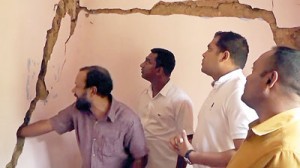 A damaged house Thousands of Bandarawela families made homeless and landless as a result of the destruction caused by the controversial Uma Oya irrigation and hydropower project are wondering how and when will they be able to rebuild their lives. Many say they toiled in the farmlands for years in the hill town to build a dream home and lay the foundations for a better life for their children. But now, their homes are in ruins and their lives and livelihoods are destroyed. Shriyani Yapa from Medahinna, Bandarawela, says they had lived contented lives until now and she is not sure what life will bring, now that her family is displaced for no fault of theirs. “Today, we are even left without water to drink.’’ Sanjeewa Somasiri, also from the area, and who represents the displaced, wonders about where he could live. “We don’t have the money and time to build new houses. We cannot afford to buy new land to build houses.’’ He is aware that his land is worthless. Another resident of Bandarawela, Lalith Wijesundra, laments that a self-sufficient farming community has been destroyed. “The village we live is Uduperuwa and the tunnel that carries the water to Hambantota lies beneath our village. We experienced a drought in December in 2014 when all the wells in our area went dry,’’ he said. Paddy lands died up, the land began to crack, and homes crumbled, he added. He said the Geological Surveys and Mines Bureau made an inspection and confirmed that the groundwater had been sucked out. The curse spread to Kurundugolla, Weheragalathenna, and Egodagama, “We are farmers,’’ he said reminding the authorities that the hard-earned gains in their lives have been “robbed’’. He notes that the farmland badly affected by the Uma Oya project, stretches out to “some 400 acres’’. “We never asked for this kind of development. All our homes have been ruined and we spend every night in fear. Just to provide water to some other place they have converted this area into a desert. We live in fear of death.’’ He is pleading for assistance and justice. Uwa PC Councillor Samantha Widyaratne, demands that the Bandarawela villages and the farming lives be rebuilt: “We knew of the repercussions of this project to Welimada and Bandarawela areas after soil tests. As the project moved on, the damage followed as expected. The Government must rehabilitate the villages.” 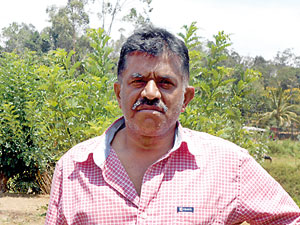 Lalith Wijesundra 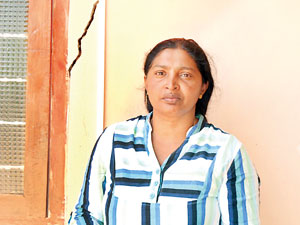 Shriyani Yapa |

